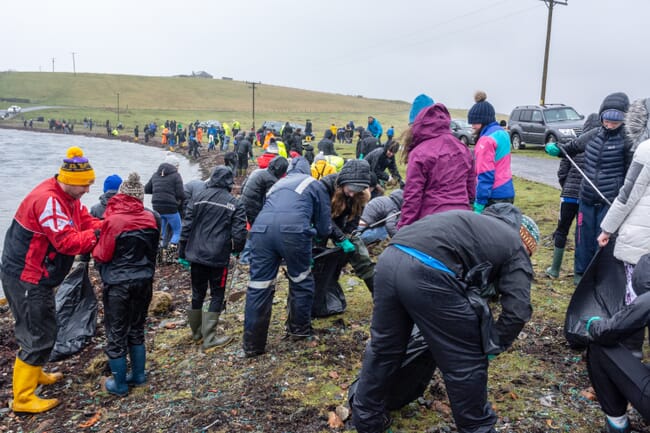Scottish Sea Farms first took part in the iconic annual event last year, when its Orkney team organised two local beach cleans and collected 600kg of mixed man-made waste.
This year, all three of the company’s farming regions – Orkney, Shetland and Scottish mainland – have organised beach cleans and are inviting anyone living or working locally to join them.

© SSF
Scottish Sea Farms’ managing director Jim Gallagher said: “Awareness of the need for us all to be responsible custodians of our environment has never been greater. Getting involved in the MCS Great British Beach Clean is a way to make an immediate and positive difference, complementing the many initiatives underway at company level to reduce waste and strengthen our environmental credentials further.”
Kicking things off on Saturday 21 September will be Scottish Sea Farms’ Barcaldine hatchery team who will be out in force to clean Teithil Beach on the banks of Loch Creran.
This will be followed on Sunday 22 September by the Shetland team who will be cleaning the beach around Scottish Sea Farms’ shore-base at Clift Sound in Burra. Amongst those expected to join them are players from Shetland Junior Football Association (SJFA) local club teams, all of whom Scottish Sea Farms sponsors via its Heart of the Community initiative.
Lastly, on the morning of Monday 23 September, Scottish Sea Farms’ Orkney team will be undertaking two beach cleans: Echna Loch Bay in the north and Weyland Bay in the south.
Kirsty Brown, environmental scientist with Scottish Sea Farms and organiser for the company’s Orkney beach cleans, said: “We’ve organised one beach clean in the north and one in the south so that all our farm teams can get involved. If those living or working locally can be persuaded to lend a hand too then all the better.
“It only takes a couple of hours at most and we’ll supply high visibility safety vests, gloves, pickers and bags. All volunteers need to do is make sure they’re dressed appropriately for the local conditions.”
Removing litter is just one element of the MCS Great British Beach Clean. Equally valuable is the beach survey that’s undertaken at the same time.
Ewen Leslie, freshwater engineer with Scottish Sea Farms and organiser of the Barcaldine team beach clean, explained: “One of the things that differentiates the MCS Great British Beach Clean from others is that organisers are asked to complete a survey of the litter collected: everything from the type and size of material to the number of items. This data is then collated within national and global databases, providing vital information for future analysis and reporting.”
The MCS attributes such data with helping bring about advances including the plastic bag charge, the banning of microplastics in personal care products, better wet wipe labelling and growing calls for a tax on single-use plastics.
Calum Sinclair, health & safety coordinator with Scottish Sea Farms and organiser for the company’s Shetland beach clean, concludes: “Quite simply, the more people that get involved, the more we can collectively do to preserve and protect our local environment – something that’s in everyone’s interest.”


